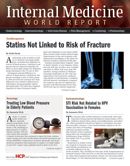Publication
Article
Internal Medicine World Report
Shared ChikV and Rheumatoid Arthritis Symptoms Can Cloud Diagnosis
Author(s):
As the Chikungunya virus increasingly gains awareness, more is being learned about treatment of the tic born disease including how it interacts with other pre-existing medical issues.

As the Chikungunya virus increasingly gains awareness, more is being learned about treatment of the tic born disease including how it interacts with other pre-existing medical issues.
Recent research had indicated that tests for the virus and rheumatoid arthritis (RA) can sometimes present similar results for patients. The findings, recently published in, Arthritis and Rheumatology, showed further evidence of how a proper diagnosis can make a significant difference in the efficacy of the course of treatment.
“For now, good travel histories of patients are among the best diagnostic tools for physicians,” noted senior author Wayne Yokoyama, MD, who serves as the Sam and Audrey Loew Levin Professor of Medicine at the Washington University School of Medicine. “Recent travel to the Caribbean, Central and South America, Africa, India or other areas where the virus is prevalent should raise suspicions of Chikungunya infection.”
Yokoyama said other symptoms, including fever and “abrupt onset of severe pain in the joints,” should be indications of it being the infectious disease rather than the arthritic condition.
The Washington study involved 10 residents from the St. Louis Area who had been to Haiti in June of 2014. They were then evaluated between 7 and 10 weeks after reporting symptoms. Of that group 8 “developed persistent arthritis, several with joint pain so severe they had difficulty walking.”
Lead author Jonathan Miner, MD, PhD, said the 8 patients developed symptoms that “met the American College of Rheumatology’s criteria for a diagnosis of rheumatoid arthritis.” It was their travel to Haiti that tipped doctors off to the possible alternative diagnosis.
During testing of the patients researchers saw similarities in the development of “specialized immune cells,” which showed a link between the 2 conditions.
While RA is usually treated with immunosuppressants, the authors noted that has not been shown to be an effective treatment for Chikungunya. The virus affected more than 2000 people in 2014 alone, with most cases being tied to the patients traveling to the Caribbean. The statement also notes that 11 cases in Florida were of people who had not left the country.
Symptoms of Chikungunya can include fever, rash, and severe joint pain with the first 2 symptoms lasting between 7 and 10 days. The arthritis type symptoms can last considerably longer, perhaps up to 3 years.
“We’re anticipating that Chikungunya virus will spread broadly in the United States, so it’s important to develop better tools for diagnosis, prevention, and treatment,” said co-author Deborah Lenschow, MD, PhD.

2 Commerce Drive
Cranbury, NJ 08512
All rights reserved.





